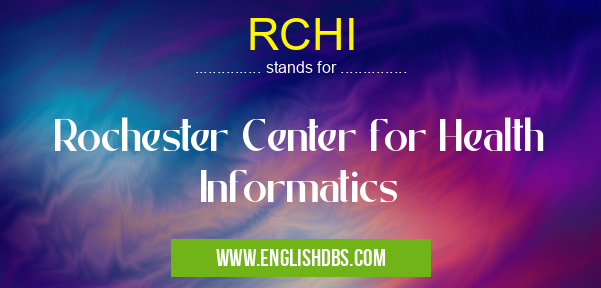What does RCHI mean in HEALTHCARE
The Rochester Center for Health Informatics (RCHI) is an innovative research center located at the University of Rochester in New York State. The mission of RCHI is to advance the field of health informatics by providing a research hub that integrates clinical and technology expertise with a team approach to create solutions that improve patient outcomes. RCHI collaborates with other health care organizations and government entities to develop products and services that help further improve healthcare delivery.

RCHI meaning in Healthcare in Medical
RCHI mostly used in an acronym Healthcare in Category Medical that means Rochester Center for Health Informatics
Shorthand: RCHI,
Full Form: Rochester Center for Health Informatics
For more information of "Rochester Center for Health Informatics", see the section below.
» Medical » Healthcare
What Is Health Informatics?
Health informatics, also referred to as medical informatics, is the science of using information technology to create, store, manage and use healthcare data in order to improve patient care. It encompasses all aspects of collecting data, including data collection methods and tools; designing databases for use in healthcare organizations; analyzing data for identifying patterns; securing privacy and security procedures; reporting results of analysis; providing guidance on how best to use collected data; managing changes in technology over time; improving data sharing between providers; integrating disparate sources of data into one system; and developing software applications necessary for storing, collecting and managing healthcare data.
How Does RCHI Contribute?
RCHI contributes to the field by engaging with researchers from diverse disciplines within medicine, computer science and engineering who collaborate together on various projects. This interdisciplinary approach ensures a comprehensive understanding of the problem being solved so that innovative solutions can be developed that truly address the needs across various domains. With advanced technologies such as artificial intelligence (AI), machine learning (ML) and natural language processing (NLP), RCHI is able to develop products that can quickly analyze large amounts of structured or unstructured health-related data from electronic health records (EHRs) or other sources. This enables insight-driven decisions which can pave the way for improved patient outcomes through better diagnosis and treatment decisions.
Essential Questions and Answers on Rochester Center for Health Informatics in "MEDICAL»HEALTHCARE"
What is Rochester Center for Health Informatics?
The Rochester Center for Health Informatics (RCHI) is an interdisciplinary research center dedicated to improving health informatics. It focuses on information technologies, data mining and analytics, digital health, and patient-oriented healthcare technology applications. RCHI is located at the University of Rochester in New York State.
How can RCHI improve healthcare?
RCHI seeks to apply a rigorous scientific approach to develop breakthroughs in the domain of health informatics and digital health. By discovering new ways to link information technology with public health, healthcare delivery systems, and patient care, RCHI aims to empower individuals with better access to information, assistance in making decisions, and improved quality of life outcomes.
What types of research does RCHI conduct?
Current projects at RCHI focus on various areas such as artificial intelligence for medical decision support; informatics for diabetes prevention and management; data mining for population studies; novel sensors for medical wearables; machine learning for remote sensing; natural language processing for health communication. We also conduct research into how mobile applications can impact patient engagement and care coordination processes.
Who funds the research conducted at RCHI?
Funding sources include government grants from agencies such as the National Institutes of Health (NIH), the Centers for Disease Control (CDC), as well as industry partnerships with companies such as IBM Watson Health, Microsoft Research Healthcare NExT, eHealthcare Solutions Inc., Oracle ICM Healthcare Solutions Inc., Emerson Electric Co., and Zebra Technologies Corporation.
Who are some of the key figures involved in research at RCHI?
The Director of Research at RCHI is Dr. Christopher Sakezles who has published extensively in the field of medical informatics focusing on personalization techniques that leverage existing knowledge bases; machine learning algorithms; AI techniques; data mining approaches; temporal modeling techniques; semantic technologies including ontology engineering and reasoning algorithms. Additionally our faculty includes leading experts from across the field ranging from epidemiologists to computer scientists to statisticians whose work further drives innovation at RCHI.
What qualifications do I need to work at or collaborate with RCHI?
To work at or collaborate with us you must have an understanding of biomedical sciences or a related field good analytical skills proficiency in scripting languages such as Python a strong background or interest in clinical informatics experience developing software systems managing clinical datasets advanced statistical training or equivalent experience preferred but not required.
How can I stay informed about upcoming events hosted by RCHI?
You can stay connected by following us on Twitter (@Rchihub), Facebook (/Rchihub/) Instagram (@rchi_hub), attending our conferences & workshops, subscribing to our mailing list (contact [email protected]) and reading our blog posts & reports which cover emerging topics & new trends & evidence-based solutions from our researchers which will keep you up-to-date on ongoing & upcoming projects @Rchihub
Final Words:
The Rochester Center for Health Informatics is an important resource for advancing the field of health informatics through its contribution to research projects involving AI, ML and NLP techniques. By utilizing these technologies, RCHI helps drive better patient outcomes though improved decision making based on detailed insights garnered from complex datasets.
